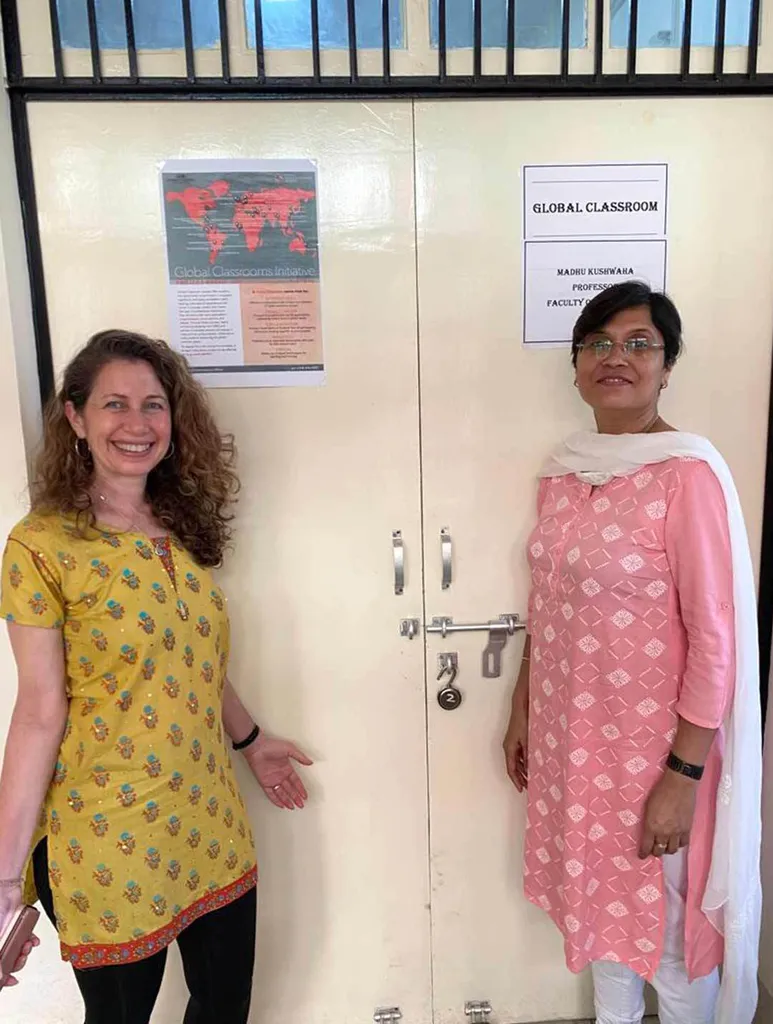- April 08, 2022
- By Sala Levin ’10
From the anxiety of buying that first box of tampons to crafting a euphemistic “I’m feeling under the weather” email to the boss when cramps are too debilitating to leave the couch, menstruation can be a source of discomfort that goes beyond the physical. A new course at UMD is hoping to give voice to the silence that endures around the topic of menstruation–both in the U.S. and internationally.
“Teaching Menstrual Health: Dispelling Myths and Misconceptions,” a Global Classrooms course led by Associate Clinical Professor of family science Elisabeth Maring and Professor Madhu Kushwaha of Banaras Hindu University in Varanasi, India, virtually brings together American and Indian students to talk about cultural perceptions on the topic and how education can be used to empower those who have periods.
“We’re really focused on where people who menstruate from the U.S., India and (around the world) experience stigma and taboos around menstruation that may impact their health outcomes,” said Maring.

Though the topic of menstruation may have been discussed in middle school with a crudely drawn chalk diagram, several UMD students said the issue was largely bypassed in their prior education. Sarita Miller ‘23, who’s the undergraduate teaching assistant for the course, said she had “maybe one biology lecture where it was at the very cellular level of, ‘This is the egg and it’s released and this is the cycle, here’s a graph of what your hormones look like, let’s move on.’”
That bashfulness about getting into the day-to-day realities of periods contributes to a culture of shame around the experience, said Maring. Young people quickly learn that menstruation is to be discussed with doctors and maybe mothers, if at all.
That silence can be compounded by religious beliefs. In some Hindu communities within India, menstruating people are denied entry to temples or shrines and forbidden certain foods. In some places, menstruation huts, which may be far from the village and subject to the elements, are built for people to go to during their periods. Menstrual products are also hard to come by; a 2016 National Family Health Survey found that 36% of menstruators in India used sanitary napkins, while the rest used rags or leaves.
“Once the cultural perception of menstruation–from being a taboo stigma to a normal physiological process–is changed, we can hope that future menstruators would raise their voices unashamedly for better sex/health education and access to menstrual products in their society,” said Kushwaha.
Matthew Fairchild ‘23 said it was an opportunity to explore “something I’ve never really had a chance to learn about before.” The continued squeamishness around discussing menstruation is, in part, “upheld by treating classes like this as just a class for girls to take, or that it’s something boys don’t need to learn about,” he said.
Three UMD students each pointed out something they hadn’t expected: the Indian cohort is composed largely of self-identified men who are “genuinely interested in the topic,” and eager to make social change, said Kushwaha. “There’s kind of a palpable energy around … taking this out of the classroom and taking it into communities where menstruation is so stigmatized, especially among the male students,” said Fairchild. “I was not expecting there to be so much passion from the male students in the class.”
The course in Global Classrooms, an initiative within the Office of International Affairs, has given UMD students unique insight, they said. “I’d read a lot about (menstrual health), but this classroom gave me for the first time perspective from people actually living in India,” said Miller.
Apoorva Ajith ’24 agreed. “Building relationships with the people you’re working with is so important for your own understanding” of research and data. “It just kind of emphasizes again all the similarities that you don’t always think about.”
Topics
Campus & CommunityTags
Family ScienceUnits
School of Public Health